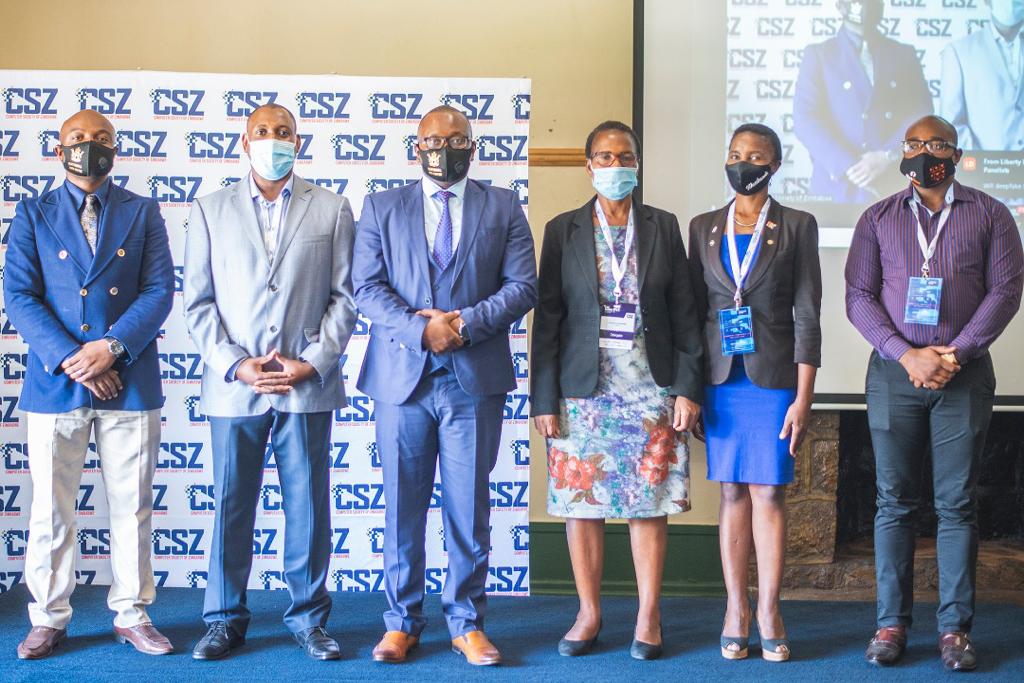Dr. Jenfan Muswere, the Minister of Information Communication Technology (ICT), Postal and Courier Services has called on stakeholders to embrace cutting-edge technology to advance our society and our shared interests.
Minister Muswere made the remarks at the Computer Society of Zimbabwe (CSZ) ICT Summit held in Nyanga from 25 to 27 November 2020.
“It gives me great pleasure to be here on the occasion of the 2020 Edition of the Computer Society of Zimbabwe (CSZ) Summit – another BIG conversation on how we, as Zimbabweans, are going to take advantage of cutting-edge technology to advance our society and our shared interests. To start off, I would like to congratulate Computer Society of Zimbabwe for embracing the “new” and “next normal”, by hosting a hybrid Summit during such difficult times. It is pleasing to be standing in front of many delegates in this room, and many more in front of their screens, who are attending the conference virtually.” Dr. Muswere said.
The theme of the conversation was “Beyond 4IR: Transitioning from the Pandemic”. It was befitting in that the conference came as Zimbabwe, like the rest of the world, is navigating through the COVID-19 pandemic which has changed the way of life.
The Computer Society of Zimbabwe is one of the leaders in the conversation around how digital transformation can be pivoted as a strategy, in not only adapting to the COVID-19 pandemic and its effects, but to take advantage of the new opportunities it presents. The fourth industrial revolution brings with it many technologies such as artificial intelligence, internet of things, robotics, virtual reality, the cloud, and 3D printing which present vast opportunities in the entirety of the economy
However, Dr. Muswere pointed out that it is not going to be all smooth sailing. With the increased utilization of these technologies also come new complexities, particularly in ensuring data protection and privacy.
“What comes to mind, immediately, are the cyber-security implications. As we transact, innovate, communicate, disseminate, and explore the fundamental question is “Who is policing the fair use, safety, and intrusion of the cyberspace?” This is perhaps one of the biggest puzzles of this time, which my Ministry is hard at work resolving, through our efforts directed towards the Cyber Security and Data Protection Bill,” Dr Muswere said.
The bill is a legislative response to setting the right legal framework upon which all Cyber Security superstructures are to be built.
“Our vision is to build a robust framework which is watertight and provides a safe and secure environment to allow enterprises and organisations whose business is now anchored on ICTs to operate efficiently in this peculiar 4th industrial revolution.”
He added that one of the most exciting possibilities in this era is achieving efficiency in e-commerce, which is inextricably attached to the government’s objectives under the “Ease of doing business” initiative.
“It is the next level which has been accelerated by the pandemic, and all sectors of our economy have embraced, in an impressive fashion, conducting business online. Put together, legal reform in the wake of this fourth industrial revolution landscape is one of my Ministry’s top priorities as we set out to expand our reach into the global market through instilling confidence in all stakeholders.
“We are truly walking through a significant time in the history of this country, and the world. Back to you the Computer Society of Zimbabwe, whom I consider our partners-in-technology, I have keenly watched your participation in the National ICT policy framework reviews and I truly commend you for that. I applaud your invaluable insights and input into the bills, including the Cyber Security and Data Protection bill. I note, with pride, how the Computer Society of Zimbabwe seized the opportunity, with many other stakeholders in the ICT space, to join the cornerstone consultative process in building the Smart Zimbabwe 2030 initiative.”
The stakeholders’ role is not only limited to the Smart Zimbabwe 2030 – but by extension, it feeds directly into the National Development Strategy which relies heavily on the employment of ICTs in propelling development initiatives across all divides of the economy and society as enunciated in the national vision 2030. In alignment with the National Development Strategy NDS1, a digital economy, digital government, and increasingly digital society are envisaged.
The Computer Society of Zimbabwe and its broad membership all play a pivotal role in joining in the heavy-lifting that will see desired outcomes, shared as one nation, come to fruition.
The Computer Society of Zimbabwe started in 1974. In that regard, 46 years on, its members remain committed to their cause. Minister Muswere paid tribute to the CSZ President, Mr. Allen Saruchera, and the convenor, Mr. William Nyakudya, who led the effort which has seen the conference materialise.






